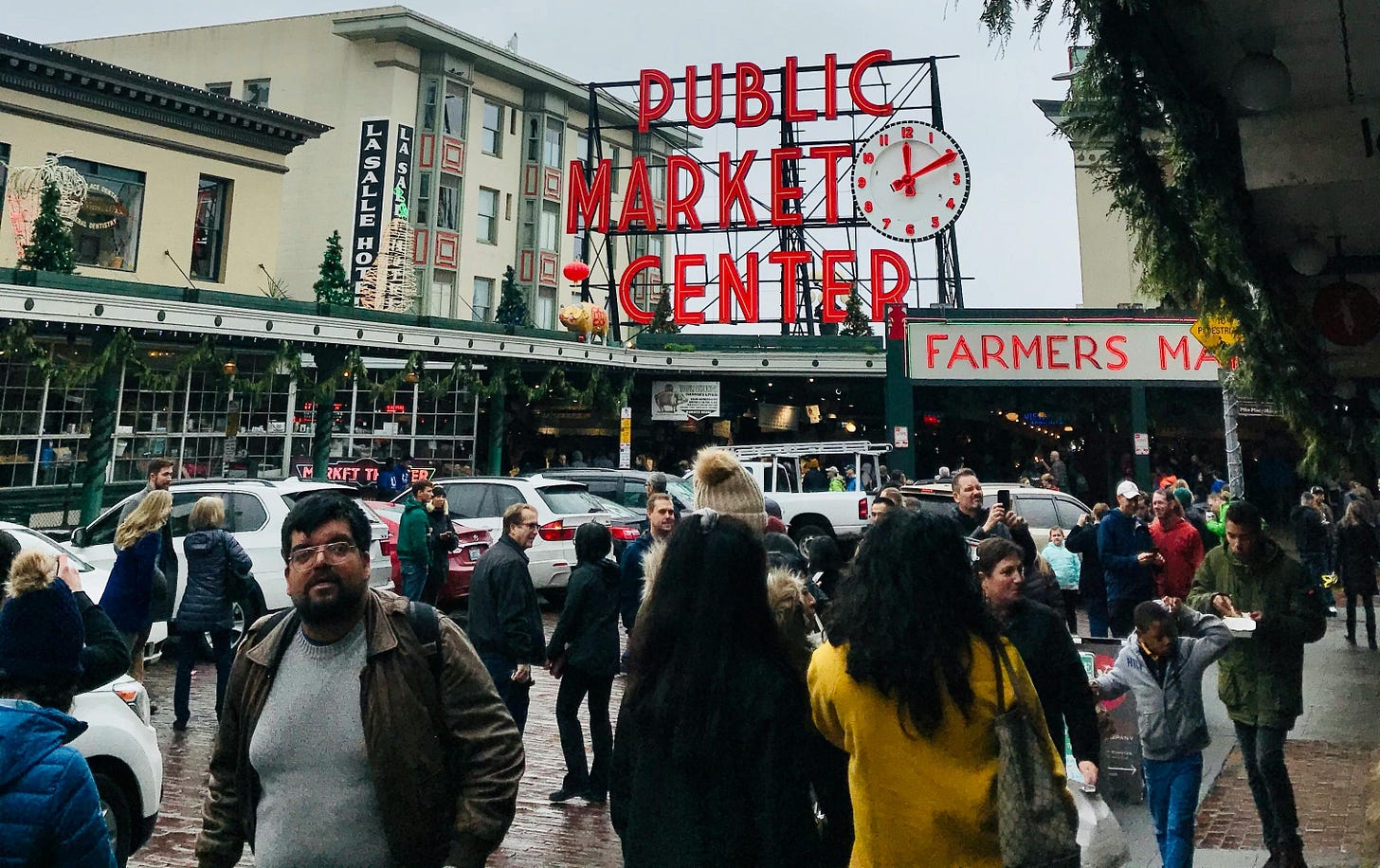Econ 101: How Do People and Markets Work? | This Week's Economy Ep. 115
Why real prosperity starts with free markets—not government interference.
Hello Friends!
There’s a growing narrative that blames free markets for our economic challenges. But the truth is precisely the opposite: markets are the solution, not the scapegoat. Alarmingly, even voices on the right—longtime defenders of market freedom—are embracing the idea that new waves of government spending and industrial policy will bring back jobs, rebuild the middle class, and restore American greatness.
But don’t be fooled: these are old progressive ideas dressed up in fresh language. What’s being proposed isn’t a real solution—it’s a return to failed policies of the past. To push back effectively, we must return to the basics: Econ 101. Markets work. And we are better off when we allow them to do so.
In today’s episode of This Week’s Economy, we’ll explore how human action drives the marketplace, how markets communicate vital information, and how freedom and responsibility together create prosperity. These foundational lessons will better equip us to promote policies that truly let people prosper.
Catch the full episode on YouTube, Apple Podcast, or Spotify, and visit my website for more information.
Timestamps
00:00 Back to Economic Basics
03:02 Understanding Human Rationality
05:52 The Functionality of Markets
09:08 The Interplay of People and Markets
11:56 Applying Economic Principles Today
15:07 The Case for Market Respect
1. Are Humans Rational?

Quick Lesson:
Do people act rationally and in their own best interest? Economics generally assumes that individuals act purposefully and in their best interests—but that doesn’t always mean they behave in ways that appear “rational” to others. Great thinkers have long argued that while humans are driven by self-interest, they may not always make decisions that seem logical from the outside.
“Human action is purposeful behavior… Action is will put into operation and transformed into an agency, is aiming at ends and goals, is the ego's meaningful response to stimuli and to the conditions of its environment, is a person's conscious adjustment to the state of the universe that determines his life.” – Ludwig von Mises
“The wellspring of human action is dissatisfaction, or, if you want to see the glass as half full, the idea that life might be better than it is at the present.” –Gene Callahan
Humans make countless choices each day, each involving tradeoffs. The real cost of any decision is the opportunity cost—what we give up in order to choose something else.
Real-World Examples:
Nothing is truly free. Time or money spent on one thing means less time or money for something else. That’s opportunity cost in action.
People value different things. A choice that seems irrational to one person may make perfect sense to someone else based on their preferences, needs, or circumstances.
Differences drive the economy. Our unique preferences and abilities allow for specialization, trade, borrowing, lending, and cooperation—the foundations of a thriving economy.
Why It Matters:
Just because we don’t fully understand someone’s choices doesn’t mean they’re irrational. When governments try to “correct” what they view as irrational behavior—by restricting choice or limiting freedom—they often cause more harm than good. These policies can lead to unintended consequences, inefficiencies, and a loss of liberty.
Liberty means not just freedom but responsibility—the freedom to choose and the commitment to live with the outcomes of those choices.
2. Do Markets Work?

Quick Lesson:
We live in a world of scarcity. Using limited means to pursue desired ends always involves tradeoffs and costs. The value and cost of goods are determined by how much people want them (demand) and their availability (supply). This is the foundation of how markets operate.
“The real price of everything, what everything really costs to the man who wants to acquire it, is the toil and trouble of acquiring it.” – Adam Smith, Wealth of Nations
Real-World Examples:
Prices contain a lot of information based on the choices of many people. And these prices give us signals as to the supply and demand for a product. People will make choices accordingly.
It’s hard to beat the market. Despite its flaws, the market is still more rational than you.
Why It Matters:
Prices are more than numbers; they’re signals. They reflect real-time information about scarcity, value, and consumer preferences. When governments distort these signals through price controls, subsidies, or tariffs, inefficiencies follow. Historical and contemporary evidence shows that empowering individuals in free markets leads to more effective, efficient, and liberty-preserving outcomes.
3. How Do People and Markets Work Together?

Quick Lesson:
Humans act in their interest within the marketplace, pursuing goals (or ends) that they value. Economics assumes people make purposeful choices to achieve those ends, and it studies the consequences of those choices. Importantly, the value of any good or service is subjective—it depends on how much someone values it, not simply on how much labor or material went into it.
Real-World Examples:
Value isn't inherent in an object or based solely on the time or resources used to make it. Instead, it's based on how much people want that good or service—this is known as subjective value.
In the marketplace, people choose by weighing options and deciding whether to search further or buy. But searching has a cost, too. For example, the effort of looking at dozens of homes may eventually outweigh the benefit of finding the "perfect" one. This is known as the paradox of choice.
Why It Matters:
What I value may not be what you value—and that’s okay. Markets allow for this diversity of preferences. However, when governments intervene and try to direct choices, such as subsidizing one energy source over another, they distort consumers' ability to decide what best meets their needs. Free markets work best when individuals choose based on their values and goals.
4. APPLYING ECONOMIC PRINCIPLES TODAY
We must recognize that markets work and are often more rational actors than humans. Intervention frequently spells disaster as it prevents markets from working.
Market Signals:
Many assume diamonds are expensive due to natural rarity, but much of their high price stems from controlled supply. Cecil Rhodes, owner of De Beers Mining Company, bought up most of South Africa’s diamond mines. By limiting the number of diamonds released to the market, he artificially reduced supply and drove prices up.
Spring typically marks the peak of the real estate selling season, but this year, first-time homebuyers are shifting focus to smaller homes in response to high prices, elevated mortgage rates, and limited inventory. Builders are also adjusting, turning to smaller builds to contain rising costs.
May’s Consumer Confidence Index has gotten a lot of attention. This report is based on a survey reflecting how people feel about the economy, not concrete data. Those feelings shift with headlines—elections, inflation, wars, or tariffs—especially in uncertain times. But that uncertainty affects the economy: when businesses and families aren’t sure about taxes, regulations, or inflation, they pause investment and hiring, slowing growth. Free markets create the conditions for true confidence and lasting prosperity by offering clear incentives and fewer barriers.
Government Distorting Markets:
When the government “forgives” student loans, it’s not free but instead shifts the burden to taxpayers and future generations. When Congress spends trillions, those dollars are diverted from productive uses in the private sector.
Government assistance like SNAP can distort normal market dynamics. Demand shifts toward certain products when recipients are limited in what they can buy. This artificial demand raises prices and profit margins for those specific goods, benefiting a few suppliers while increasing grocery costs for others.
[Insert Example here]
Texas:
Texas operates a mostly deregulated electricity market, primarily through its ERCOT system. This encourages innovation, lower prices, and responsive supply based on demand signals during normal conditions. However, during the 2021 winter storm, government interventions such as price caps and poor infrastructure regulation contributed to blackouts. Instead of allowing price signals to drive investment in resilient energy infrastructure, policy distortions led to systemic failures.
[Insert Example here]
Final Thoughts
Respect for markets is more critical now than ever.
Many of our current economic challenges result from government-driven distortions in the marketplace. Prosperity begins by letting people prosper, which starts with letting markets work. We need transparent signals about the availability and value of goods and services so individuals and businesses can make informed decisions and plan for the future. When government interferes with these signals—through overspending, tariffs, subsidies, or policies that pick winners and losers—it leads to inefficiency, waste, and widespread harm.
If we want an economy that truly serves people—not politics—we must get back to basics. Respect markets. Limit government. And always remember: Let People Prosper.
RESOURCES
Here are some recommended resources to dive deeper into studying economics:
Economics for Real People by Gene Callahan
Economics in One Lesson by Henry Hazlitt
The Moral Meaning of Markets by Ryan Langrill and Virgil Henry Storr
Acting Man by Ludwig von Mises
Wealth of Nations by Adam Smith
Who is More Rational? You or the Market? Marginal Revolution University
Behavioral Economics, Ep. 1: How and Why the Economy Works in 3 Minutes by Learn Liberty
Thanks for joining me in this week’s episode. For more resources and commentary, visit VanceGinn.com and subscribe to my Substack at vanceginn.substack.com. God Bless You! Let People Prosper!
Keep reading with a 7-day free trial
Subscribe to Let People Prosper to keep reading this post and get 7 days of free access to the full post archives.



